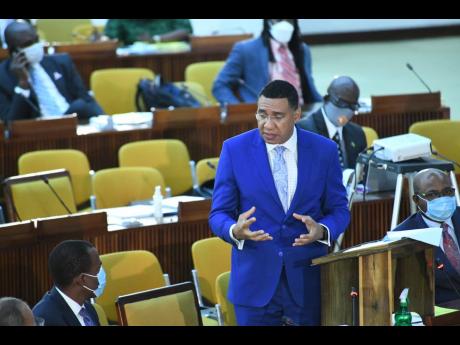Gov’t spending to jump $16b
The Holness administration’s programmed central government expenses have been increased by nearly $16 billion to $853 billion in the second Supplementary Estimates for fiscal year 2020-21.
Finance Minister Nigel Clarke, in tabling the estimates in Parliament on Tuesday, said the COVID-19 pandemic has had a severe impact on the Jamaican economy.
Despite that, he said, preliminary numbers for the six months ending September 30 show that overall revenues were $8 billion, or three per cent, higher than budgeted in the first Supplementary Estimates but 18.8 per cent less than the corresponding six months last year.
Corporate taxation and pay-as-you-earn (PAYE) taxation performed ahead of budget by 16 per cent and eight per cent, respectively, and PAYE for the first six months of this financial year was three per cent higher than the first six months of the last financial year, he said.
For the first six months to September 30, preliminary figures show consumption taxes were also up, but 14 per cent lower than last year.
Revenue from international trade was lower than budgeted by three per cent, but lower than last year by 32 per cent.
Consistent with the fall in trade volume, customs duty, stamp duty, and general consumption tax on imports were seven per cent, 28 per cent, and one per cent lower than budgeted, and 21 per cent, 40 per cent, and 27 per cent lower than last year.
Consistent with the reduction in passenger flight arrivals, travel tax receipts were down by $9.5 billion.
“The second Supplementary Estimates for 2020-21 fiscal year have been developed with the framework of this out-turn, as well as taking into consideration the continued impact of the COVID-19 pandemic,” Clarke said.
He said the first Supplementary Estimates were formulated around a projected decline in the economy of 5.1 per cent of gross domestic product (GDP) for the fiscal year. However, GDP is now estimated to decline by 7.9 per cent.
Based on operations to date and the GDP forecast, revenue and grant inflows for the full fiscal year are now estimated to be $5.2 billion more than estimated in the first Supplementary Estimates.
Given the prolonged and increasing impact of the pandemic and taking the revenue forecast into consideration, the Government has found it necessary to increase expenditure to meet COVID-19-related needs in health, education, and social welfare in further unemployment support, the minister said.
The Government is also increasing capital expenditure to support economic activity.
The proposed increases in recurrent and capital expenditure will be financed by the level of expected revenue over performance in the first Supplementary Estimates, as well as by a further reduction in the primary balance target from 3.5 per cent to 3.1 per cent of GDP, Clarke said.
“With a lower GDP growth projection and the prolonged intensity of the pandemic, some downward revision of the primary balance target was unavoidable,” the minister said.
Increased primary expenditure, that is, those outside of debt expenditure, of $16.6 billion proposed in the second Supplementary Estimates is, therefore, facilitated by $5.2 billion in additional revenue and $11.4 billion arising from the downward adjustment in the primary balance target.
He said that will be addressed in subsequent years consistent with the fiscal responsibility law to ensure that the 2027-28 timeline for achieving the debt target of 60 per cent of GDP is met.
In an effort to maximise the impact of the Government’s increased spend, focus has been placed on continuing to address the health requirements, continuing to assist individuals who have lost jobs and increasing public investments to assist in fast-tracking economic recovery, the minister said.
New recurrent expenditure under the second Supplementary Estimates will, therefore, focus on extending the unemployment support of the CARE programme, SET Cash, which provides funds of $18,000 a month to persons who were employed before the COVID-19 pandemic and who still remain unemployed and extending that to December.
“We will also be extending the cash component of the CARE programme that supports employment in the tourism sector by providing that $18,000 a month to businesses which keep on their payroll persons who earn less than the income tax threshold. That extension will cost $5 billion of which $2.2 billion is from a CARE fund, which has not yet been used,” he said.

